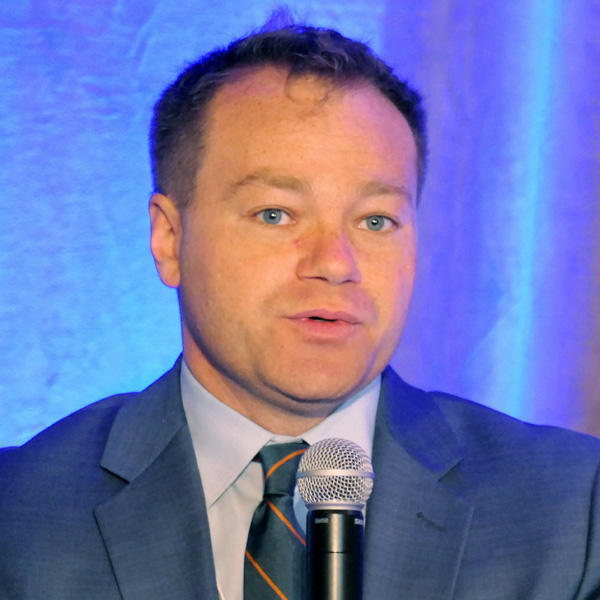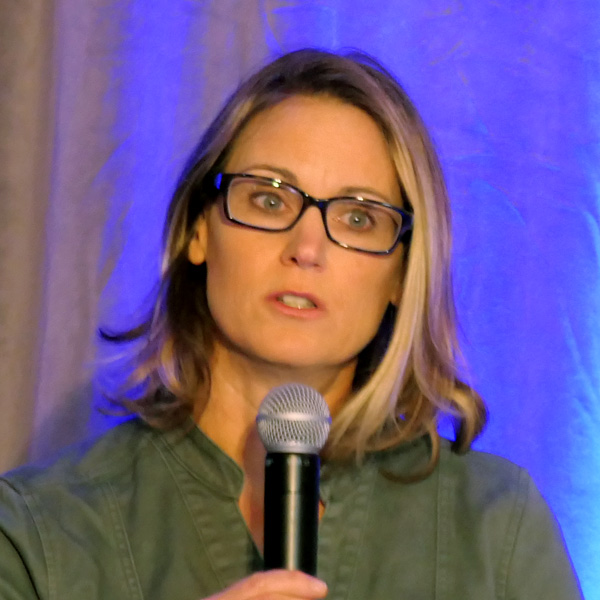Optimism and happy thoughts are not the dominant mood in New England right now as the energy sector starts thinking about how to prepare for next winter.
Despite dire pre-winter warnings from ISO-NE, the region sailed through the 2021/22 season without any serious emergencies or incidents, thanks to mild weather with no long stretches of extreme cold.
Six months before the air starts to chill again, the warnings are starting anew, and they could get even louder this time around.
During the New England Conference of Public Utilities Commissioners Symposium this week, speakers laid out a grim possible scenario for next winter, in which familiar fuel constraints, massive uncertainty from the war in Ukraine, and extreme weather create a dangerous, confusing situation for energy consumers.
 Gordon van Welie, president and CEO of ISO-NE | © RTO Insider LLC
Gordon van Welie, president and CEO of ISO-NE | © RTO Insider LLC
“When we look at modeling the weather pattern of 2013/14 against today’s resource mix, it comes up short. That’s the thing we worry about,” ISO-NE CEO Gordon van Welie said.
He said he’s equally concerned about the coming winter as the last, with positives and negatives bouncing off each other.
The RTO’s decision to prevent the Mystic Generating Station (and its LNG import abilities) from retiring, which was made three years ago and goes into effect this year, will help, he said. But hurting the region will be “massive global competition for LNG,” with scarcity and prices already around $35/MMBtu.
“As a region, we’ve tied ourselves to imported LNG. There’s no quick way of getting off it,” van Welie said.
Pain from Ukraine
Last winter, van Welie said, the conflict between Russia and Ukraine was “just beginning to emerge.”
“Russia was supplying only to meet its contracts going into last winter, so you could see the gas markets tightening up,” he said.
New England is looking at an “outlier” winter this time, warned Patrick Woodcock, commissioner of the Massachusetts Department of Energy Resources.
“We really do have to look at this upcoming winter with clarity and the assessment that we don’t have a rational market, but one that is completely transformed” by the war, Woodcock said.
Winter Insurance?
The one near-term solution tossed around by sector leaders at the conference this week was a one-year oil program to compensate generators to ensure that they have on-site fuel, like the Winter Reliability Program that was put forward for two years in the 2010s.
 Patrick Woodcock, commissioner of the Massachusetts Department of Energy Resources. | © RTO Insider LLC
Patrick Woodcock, commissioner of the Massachusetts Department of Energy Resources. | © RTO Insider LLC
“I think we do need to come together as a region to think about a one-year program that would … have additional insurance for us,” Woodcock said. “I think there’s certainly a chance that we would not take advantage of the additional insurance. But I think at this point we have to have that conversation and do it urgently.”
Craig Hallstrom, Eversource Energy’s president of regional electric operations, said he thinks “we absolutely have to have a plan, insurance, to make sure this [scenario] doesn’t happen.”
“I don’t love the Winter Reliability Program … but I accept it, because it’s relatively targeted,” said Doug Hurley, an energy consultant who used to represent consumer advocates and environmental groups and recently joined the firm Icetec Energy Services.
But van Welie threw cold water on the prospect of revisiting the program.
“I look at the oil program, and I think, do we want to pay oil units more money to do what they have a massive incentive to do anyway?” he said. “What’s the likelihood of success of us trying to stand up a program like that, get it through the system, and have it implemented in time?”
 Heather Takle, PowerOptions CEO | © RTO Insider LLC
Heather Takle, PowerOptions CEO | © RTO Insider LLC
Then there are issues of cost and regulatory uncertainty that would slow or halt its progress.
“The customer is getting hit from all angles,” said Heather Takle, CEO of the energy procurement firm PowerOptions. “We’re very sensitive when we talk about investments in transmission or reliability, about how are we coordinating those efforts to make sure it is the least-cost approach to those challenges?”
The reliability problems on hand are not ones that the RTO or markets can easily solve, said van Welie.
“When it comes to this winter, I just don’t see any easy solution. There’s a part of me that wishes I could just wave a magic wand, spring into action and … go buy the 25 Bcf it’s going to take,” he said. “But there are no solutions. We’ve painted ourselves into a corner.”
‘Anger and Confusion’
As energy officials worry about scenarios in which they might have to turn out the lights temporarily, the response of customers is top of mind. If New England is hit with a capacity shortage in the winter, it would manage the situation through conservation and controlled outages.
 Craig Hallstrom, Eversource president of regional electric operations | © RTO Insider LLC
Craig Hallstrom, Eversource president of regional electric operations | © RTO Insider LLC
“That doesn’t feel like reliability if one is a customer and your lights go out,” van Welie said.
When storms roll through the region and knock down infrastructure, it’s easy for customers to see why they lost power, albeit still frustrating and dangerous.
But in the case of a capacity deficiency?
“I’m not sure our customers are going to understand what’s happening,” said Hallstrom. “There’s going to be anger and confusion, and it’s going to be a tough event to manage. I don’t think our customers are going to understand how we ran out of energy.”
The Long Run
The longer-term view, said van Welie, is that it’s clear renewables entering New England are going to lower the use of fossil fuels.
 Doug Hurley, Icetec Energy Services | © RTO Insider LLC
Doug Hurley, Icetec Energy Services | © RTO Insider LLC
“But when we hit periods where the renewables can’t produce, or when the supply chain gets constrained, we’re going to end up with a peaking requirement that will have a fairly long duration. That’s what we’ll need to solve for,” he said.
The view that risks on ISO-NE’s system are large and growing isn’t a universal one. Hurley said that he thinks some in New England are overplaying the winter reliability risks.
“I don’t see a reason why we’re less prepared this winter than we have been in prior winters,” Hurley said. “And I hope we don’t think of it as binary, that we have to fix the whole solution, or we can’t fix any of it.”



